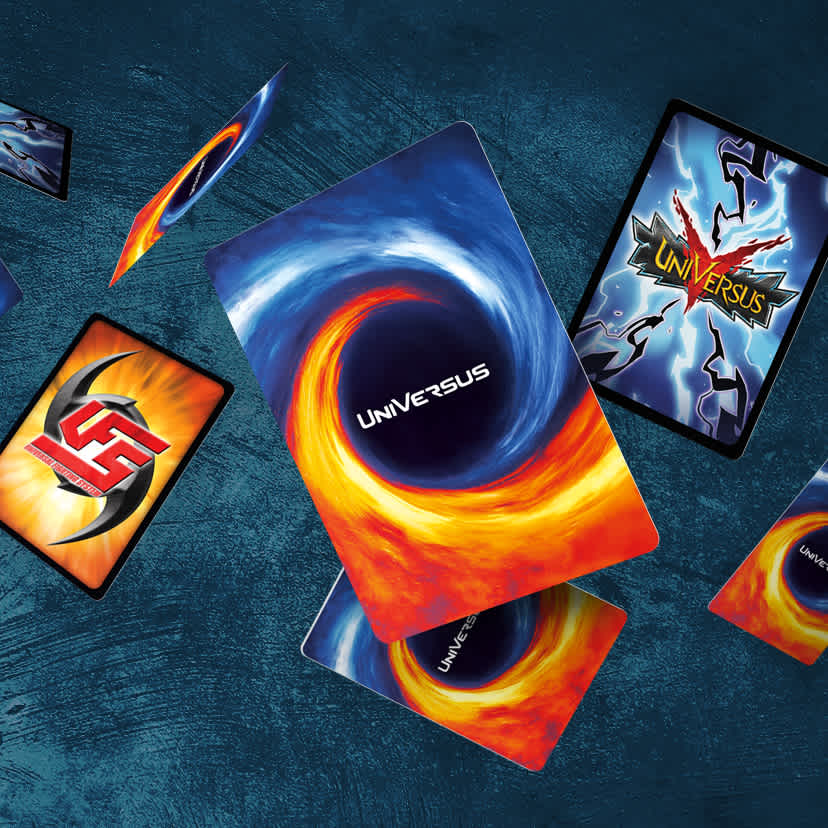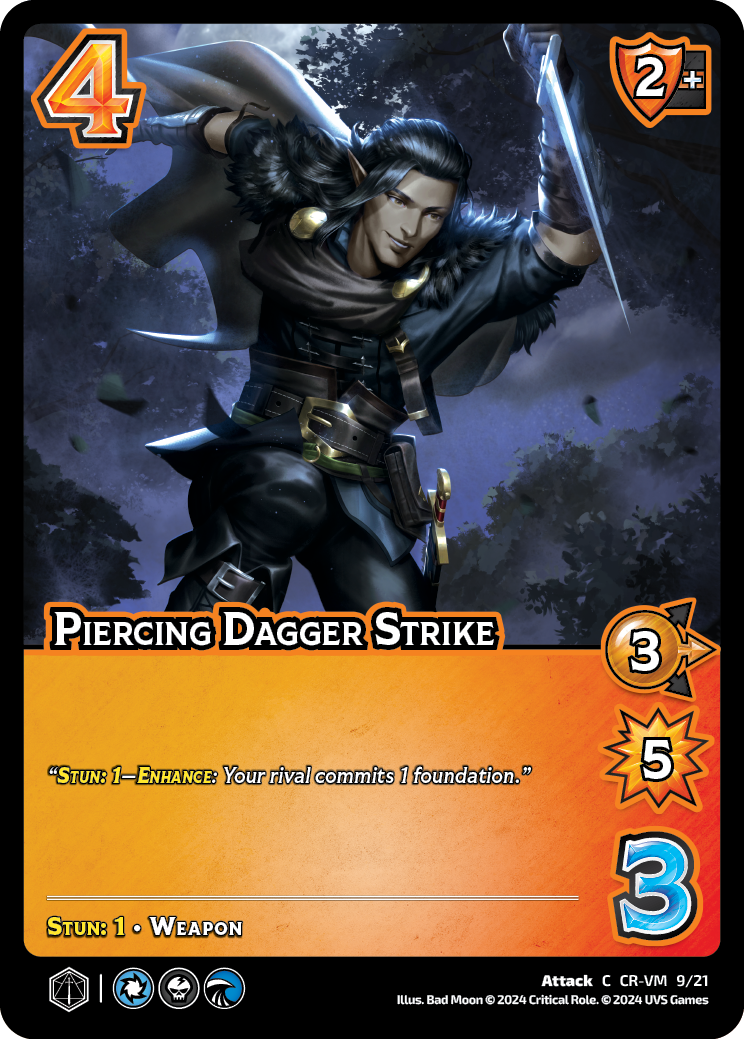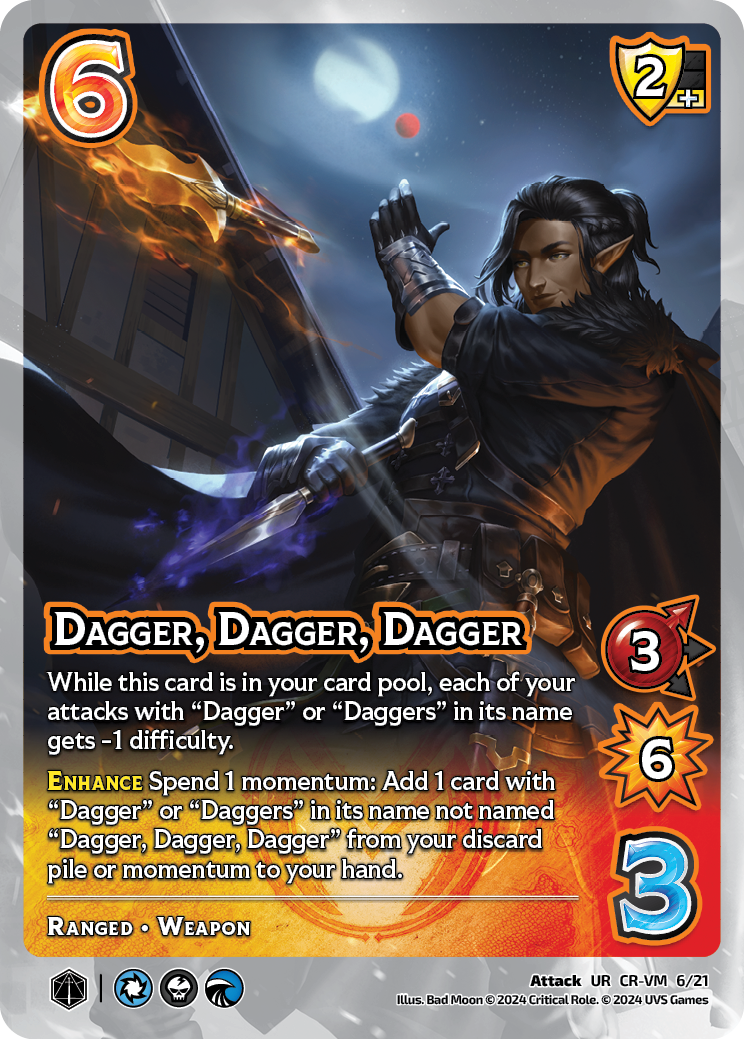

Game Design Article - Designing UniVersus: Vanillas and French Vanillas
Bill Stark, Director of Game Design
When last we spoke I talked about mental load in UniVersus and discussed how we use things like “evergreen abilities” and “reminder text” on cards to make the game more accessible. This week we’re going to talk about two more tools we use to accomplish these goals: vanilla and French vanilla cards.
Defining the Terms
What does it mean when a card is a “vanilla” or “French vanilla”? Any UniVersus card with stats, including keyword types, but no rules text, is what game design refers to as a “vanilla” card. “French vanilla” refers to cards that have no rules text except keyword abilities, and usually keyword abilities which are “evergreen” or which appear in almost every set.
Previously I’ve talked about Piercing Dagger Strike, which is actually an example of a French vanilla card:

Hand-Axe Swing is an example of a vanilla card from the Critical Role Challenger decks:

What Vanilla Does
When a new player opens a booster pack of UniVersus they’re confronted with a deluge of data from each card in the pack. A player at their first Prerelease event may begin to feel overwhelmed trying to parse all of the information in six booster packs of cards, and that’s before games in which they need to parse their cards, their rivals’ cards, and how they all interact together.
A vanilla card, then, allows a less experienced player to get a breath of air. There’s no complicated rules text to consider; they’re free instead to focus just on an Attack’s damage and speed stats, or a Foundation’s check value when it’s revealed to pay a cost. This helps to reduce mental load and make the game accessible to these players by helping us ease the pace of decisions they make as they onboard into the game, but before they’ve committed many core concepts to long-term memory.
What French Vanilla Does
French vanilla cards are similar in function to vanilla cards with a slight twist: they do have a rules ability on them. However, the keyword abilities on French vanillas appear on many cards, and as the only ability on the card allow us to use reminder text. This is powerful because it enables us to do two things:
Teach a new player a core concept that they can commit to long-term memory
Provide them a “reminder” about how an ability works at the exact moment they might need the help
French vanillas are powerful because it makes learning the game easier, and once a player has learned an ability permanently they can feel a sense of mastery of the game. “Mastery” is key in turning one-time players of UniVersus into long-time players who desire to go further in seeing what the game has to offer them.
Vanillas and Design
Something I see bandied about when talking about these types of cards is that they’re boring or uninteresting for long-time players, or that the cards are “bad.” In contrast to that belief, however, we have a rule in Game Design: don’t make “bad” cards. Bad cards aren’t fun to play, and feel bad when players open them in boosters or other products. The tricky thing about design is that it’s art, and “bad” is subjective. When we design cards our focus is ensuring every card we design is done so intentionally and to fill a role.
Because UniVersus has a lot of different player psychographics (that’s a fancy way of saying “types of players who play UniVersus”) a card you might think is “bad” might be awesome to someone else. There is a big difference between the most powerful Secret Rare in the Standard format, and the common that’s the lynchpin of your Booster Draft deck at your weekly. Every card we make, including vanillas and French vanillas, is intentionally designed to fill a role so we can make sure UniVersus appeals to all our different players, not just some. In fact, these cards help us open up additional design space that wouldn’t exist without them.
How do vanilla cards open up design space? Here’s an example I love that leans into Piercing Dagger Strike from earlier in the article:

An inexperienced UVS player benefits from Piercing Dagger Strike as a mental “break” from much more complex cards because they may examine the card based only on the data in front of them. They’re unlikely to parse that the card’s name is a mechanic itself, which provides a deeper puzzle to solve for veteran players who understand how it might interact with a card like Dagger, Dagger, Dagger. The same card that can be simple for a newer player still provides deeper complexity for veteran players, a best-of-both-worlds scenario that solves two problems at once. Here’s another example:

Ryukyu is a character who thrives on vanilla cards, helping to power them up by giving them additional abilities. This can be a compelling “build around” character for veteran players trying to min/max which vanilla cards would work best with her or a great character for a new player to onboard into organized play with. Just because a card is a vanilla or French vanilla doesn’t mean it can’t fill a role providing interesting and deep game play decisions, opening up space for our designers to fill.
Finding the Flavor
One final benefit to vanilla and French vanilla cards: they provide space for us to tell the story of the worlds we visit with each product we release. UniVersus is a game where worlds collide, and a Yu Yu Hakusho fan might not be familiar with Critical Role. Cards with less rules text allow us to include more “flavor text,” or text that tells the story of the world of characters represented on the cards. Telling stories is valuable to the types of players who love the worlds we visit, and those are both new and long-time players.
